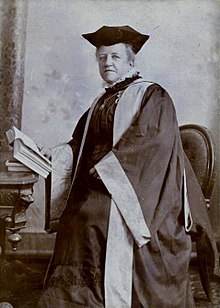Dorothea Beale
Dorothea Beale (born March 21, 1831 in London , † November 9, 1906 in Cheltenham , England ) was an English mathematician , university teacher and educational reformer. She founded St. Hilda's College in Cheltenham in 1885 and helped found St. Hilda's Hall (later St Hilda's College ) in Oxford in 1893 .
life and work
Beale was born the fourth of eleven children to surgeon Miles Beale and his wife Dorothea Margaret Complin. She was educated partly at home and partly at a school in Stratford, London until she was 13. She then attended lectures at Gresham College and the Crosby Hall Literary Institution. In 1847 they and two older sisters attended a school for English girls in Paris until the school closed in 1848. With her education now considered complete, she returned home to help her younger brothers with school, but soon enrolled as a student at Queen's College . At that time, she and her sisters, as well as Frances Buss and Adelaide Procter, were among the first students at Queen's College, which opened in 1848 on Harley Street in London. She and her sisters attended as many lectures as possible and within a year she was appointed first lady math teacher at Queen's College and in 1854 became headmaster of the college affiliated school. During the holidays she attended schools in Switzerland and Germany, where she met Elizabeth Ferard in 1856 in the deaconess institution in Kaiserswerth . In the same year she anonymously published a small brochure promoting this house. In late 1856 she left Queen's College, dissatisfied with its administration, and in January 1857 became director of the Clergy Daughters' School in Casterton, Westmorland. There her insistence on reform led to her resignation the following December. In search of new work, she taught math and Latin at Miss Elwall's School in Barnes, London, and wrote a textbook in English and general history. Cheltenham College for Boys was founded in 1841, and in 1853 the Headmaster, Assistant Headmaster, and four other gentlemen, who all had daughters, decided to create a similar facility for girls. In 1854 the first 82 schoolgirls gathered under the first headmistress, Annie Procter. After Miss Procter's resignation four years later, Beale was named Headmistress, having just completed her "Textbook of English and General History". She was selected from fifty candidates and devoted the next forty-eight years to developing Cheltenham Ladies' College, which by the time of her death in 1906 had grown to a community of approximately 1,000 students worldwide, and one of the first colleges to offer courses for the training of secondary school teachers offered. In 1880 the college was founded as an independent company and had 500 female students. In 1864 her successes as headmistress were already recognized. In 1865 she reported to the Foundation Commission and her evidence, published in 1868, gave the education of girls in England a strong impetus. In 1869 she published the Commissioners' Reports on Girls' Education with a foreword, which made a remarkable account of the low average standard of teaching in girls' secondary schools before 1870. Beale realized that the lack of funds to train teachers was a major barrier to improvement. She succeeded in having the country's first training college, St. Hilda's College, Cheltenham built and opened in 1885. To give trainee teachers the opportunity to spend a year at Oxford, she bought Cowley House in Oxford in 1892, which opened in 1893 as St Hilda's women's dormitory. In 1876 she established a kindergarten class in Cheltenham, and soon thereafter a kindergarten teacher training department followed, which became an integral part of college work.
In 1880 she founded Cheltenham Ladies' College Magazine and remained its editor until her death, mainly to connect past and present students. With the same goal, she founded "The Guild of the Ladies" Cheltenham College in 1884, which until 1912 had 2,500 members. In 1874 she was a founding member of the Association of Head Mistresses, its president from 1895 to 1897, and a member of numerous educational societies. In 1894 she reported to the Royal Commission on Secondary Education, chaired by James Bryce, 1st Viscount Bryce . In collaboration with Lucy HM Soulsby and Jane Francis Dove, she presented her new views on the education of girls in girls' schools. As Vice President of the Kensington Society, she identified with the movement for women's suffrage. Her activities went unimpaired in her later years, despite her numbness and signs of cancer that made themselves felt in 1900. In 1901 she was given the Freedom of the City of Cheltenham for her work at Ladies' College. In 1902 the University of Edinburgh awarded her an honorary doctorate (LLD) from the University of Edinburgh. Until then, the entomologist Eleanor Anne Ormerod had been the only woman to receive this honorary title in 1899. Beale died on November 9, 1906 after cancer surgery in a nursing home.
Web links
- John J. O'Connor, Edmund F. Robertson : Dorothea Beale. In: MacTutor History of Mathematics archive .
- biography
- Short biography at Oxford Reference
- Biography in encyclopedia.com
- Those who can't, teach: Dorothea Beale & Cheltenham Ladies' College
| personal data | |
|---|---|
| SURNAME | Beale, Dorothea |
| BRIEF DESCRIPTION | English mathematician, university teacher and educational reformer |
| DATE OF BIRTH | March 21, 1831 |
| PLACE OF BIRTH | London , England |
| DATE OF DEATH | November 9, 1906 |
| Place of death | Cheltenham , England |

